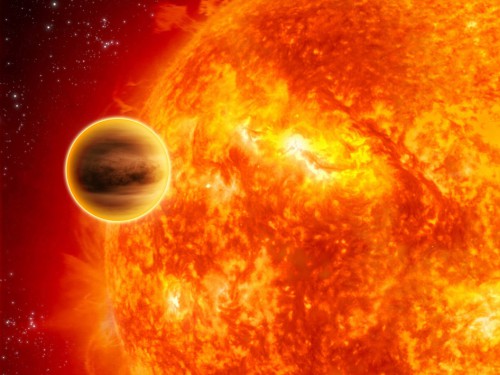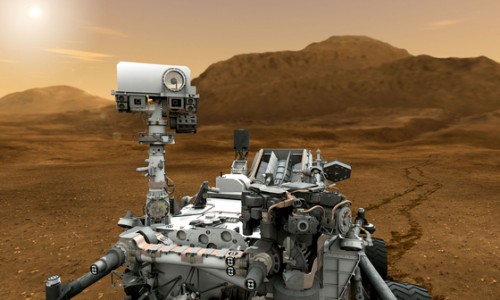
There were two different stories floating around the internet last week—each one startling in its own right, and both highlighting the ups and downs in the search for alien life.
First, after Curiosity drilled into a rock on Mars, scientists declared that in a long-ago epoch of Martian history, the Red Planet had an environment that very well could have supported life. Just as intriguing was an article written by Charles Cockell, the director of the U.K. Center for Astrobiology at the University of Edinburgh, who said that “although habitable alien planets might abound in solar systems around the universe, it does not mean these locales harbor extraterrestrial life.” His theory is that alien life may be rare across the universe, if it even exists at all.

One of those holds a glass-half-full outlook for the possibility of extraterrestrial life, and the other is distinctly half-empty.
So, what are we to make of this?
The latest discovery on Mars is just one more piece in the cosmic puzzle that indicates life in our galaxy may be plentiful. New theories suggest that as many as a billion Earth-type planets may exist in our galaxy and that the star nearest our own may have a planetary system as well. We know the same process that made our planet happens throughout the galaxy, and the same elements that made life possible here exist in much of the universe. It’s now also thought that even brown dwarfs may have planetary systems around them suitable for some forms of life. And if that’s not enough, the recent discovery of sucrose (more commonly known as sugar and also an important ingredient for life) was discovered around a star 400 light-years away.
Cockell’s theory is that life on Earth is just a random series of events which may have happened totally by accident, and that the odds of it occurring again somewhere else are long indeed. If there were only a million or so stars out there, we could concede he might have a point—but there aren’t. There are about 200 billion stars in our galaxy, many of which have planetary systems containing at least one world or more that could be habitable—that’s a staggeringly large number. And the odds are highly unlikely that, in all that cosmic real estate, we are the only game in town.
Given that life has appeared on one world in our solar system and quite possibly has existed on a second—in essence, if we found multiple instances where life emerged within a single solar system—it would virtually guarantee that this process has taken place repeatedly throughout the cosmos.
Intelligent life … now that may be another story.
Many scientists think SETI’s (Search for Extraterrestrial Intelligence) lack of success after 50 years of searching is further proof that Cockell is right, but this lack of evidence could be due to a combination of other mitigating factors. Because of the vast number of stars out there, and the potential radio frequencies a civilization might be broadcasting on, only when more powerful telescopes come online do we have a chance of detecting them. Even then it still might be difficult, because our rapidly advancing technology, our satellite TVs, and the digital revolution are soon to render our planet into what Frank Drake describes as “invisible” to aliens—at least in the radio spectrum.

Noted British astronomer Sir Martin Rees suggests aliens may be using entirely different forms of communication, such as neutrinos or gravitational waves, or methods we can’t even fathom. The late Arthur C. Clarke summed it up best when he said, “The fact that we have not yet found the slightest evidence for life … much less intelligence … beyond this Earth does not surprise or disappoint me in the least. Our technology must still be laughably primitive, and we may be like jungle savages listening for the throbbing of tom toms while the ether around them carries more words per second than they could utter in a lifetime.”
Fermi’s Paradox basically says if advanced aliens are out there, then we should have seen evidence of them by now. But perhaps there is another way of looking at it. Because the majority of stars are considerably older than ours, aliens should be far more advanced than us—and keep in mind we are not talking about our TV and movie aliens that are, at the most, two hundred years or so further along. We are talking probably thousands of years. And if that’s true, surely they must have long ago developed the sensitive instruments required to bridge the vast distances between the stars and detect our presence. Which means they know we’re here. So, why haven’t they dropped by? There could be many reasons. One favored by some is that intelligent life in our galaxy is abundant enough, but we are just too primitive to make the long trip to our remote little spot on the galaxy’s spiral arm worthwhile to them. There are probably many far more interesting and much closer places for them to go.
The only question that really is left: just how pervasive is intelligent life? Probably more than a lot of us think, but not as much as we would have hoped. A conservative guess would put that number at about 2,000 in our galaxy. Now that may sound like a large number, but it’s really not. If there are 200 billion stars in our galaxy, then only .00001 percent of all stars have an intelligent civilization orbiting around them. Or to put it another way, one out of every 100 million stars probably has a world with intelligent beings living on it.
So which is it—a lot or a little?
That depends on your point of view.
As mentioned earlier, there are worlds within our own galactic backyard which we could find life on in fairly short order. How soon? Within 5-7 years from now we could discover compelling evidence that life exists in our solar system. The prime locations being underground on Mars, deep within the oceans of Europa, or possibly Enceladus.
Within 10-15 years we should have developed sophisticated enough telescopes to image exoplanets directly and analyze the spectral signature of their atmospheres. At this point we could discover compelling evidence that life exists outside our solar system on one of the many planets or moons that exist in the Milky Way.
What about 15-20 years from now? We may very well have detected a signal or been able to observe some type of compelling evidence that intelligent life exists in our galaxy. This will not only rewrite the textbooks, but also fundamentally alter the way we feel about ourselves and our place in the universe.




The solution to the Fermi paradox is anybody’s guess, according to their point of view, as Mr. Fain correctly states. We don’t even know how life arose here in the first place. We can only make educated guesses. We basically don’t even know what cosntitutes life. We have only one example. The definition of life is still a big philisophical debate.
http://news.discovery.com/space/alien-life-exoplanets/what-is-life-anyway-130313.htm
So how can we conclude either way, about the existence or not of extraterrestrial life? The possibility exists that we may have stumbled upon alien life and didn’t recognise it as such. The Gaia hypothesis (a highly intriguing idea!) states that the Earth itself in essence is a living self-regulating organism. Could we perceive other heavenly bodies as organisms and include them in our definition of life, no matter how outlandish the idea sounds?
http://www.centauri-dreams.org/?p=23203
There is a long history of athropocentric views about humanity and Earth’s place in the cosmos: the centre of the Universe, the centre of the Solar System, and lately that Earth maybe the centre of all life in the Universe. Yet the Universe is ultimately stranger than our wildest imaginations, as scientific discoveries constantly show. I wouldn’t be surpised at all if our biggest questions about the Universe were answered in a way that nobody could have ever imagined.
With nearly 60 years of space exploration and about 50 of which involving planetary probes, we have only just begun to scratch the surface in our effort to find life “out there.” Curiosity, in my opinion, has settled the question of the possibility of life. The building blocks have been created and are abundant. Even if we accept the number of “2,000” planets capable of supporting life in our galaxay, there are untold billions of galaxies “out there.” Intelligent life? That is indeed another question. But mankind should not be so egotistical as to reject the notion of no other intelligent life in the cosmos. It may very well take millenia to discover the answer to that question….but I am optomistic that we WILL detect signs of intelligent life.
Once again, like no other, AmericaSpace gives me pause for thought, and perhaps, thought that is a bit disquieting. Andrew Fein has written an excellent opinion which is obviously the product of highly intelligent analysis and reasoned introspection. As has become the standard, Leonidas and Tom Vasiloff have contributed exemplary examples of what the brightest members of the space community have to offer, their posts are always a genuine pleasure to read. The problem resides in your friend Karol. Are we in the space community alone in our fascination with the incredible possibility of life elsewhere in our galaxy? “Normal” individuals seem to be obsessed with “brackets” and college basketball stars playing with their balls. Untold media hours have been spent on something that will probably be relegated to fodder for bar stool bets a year from now, while nightly reports on the successes of Curiosity, Cassini, Opportunity are . . . . I am amazed and astonished at what NASA has, and could discover. At this point in time it is as if we have a bucket of space exploration possibilities, a bucket of diamonds, saphires, and emeralds at our feet, but the public just isn’t interested in scooping up a handful. Am I a tin-foil-hat-talking-to- Venusians-in-the-park looney for believing that this issue may have an inestimable impact on humanity? Why are only the individuals who post on AmericaSpace seemingly aware of the importance of this matter? (C’mon admit it, given the quality of the posts, followers of AmericaSpace do seem to be a cut above the rest). Are we, am I, crazy on a ship of fools? The possibilities inherent in the inevitable discovery of extraterrestrial life, be that in the salt-water ocean under the frozen surface of Europa or from a source far beyond our solar system, are staggering. Why do so few members of the general public seem to care? How many members of the public have seen the image of the surface of Saturn’s moon Titan taken by the Huygens lander? How many have seen the up-the-skirt image of a pantyless Brittany Spears exiting a limo? The public attention span is riveted for a day or two when an asteroid explodes over Russia, then it’s back to the Kardashians. Andrew, Leonidas, Tom, Jason – thank you for your patience with my frustration induced rant. Well, I’m off to cover my body in ashes, put on a sack-cloth robe, and stand at the end of a freeway off-ramp with a sign saying, “We are not alone”.
Also Karol, if you have a Facebook account, you can subscribe to the Penny4NASA page and connect with hundreds of like-minded individuals.
Karol! Yes – by all means subscribe to the awesomeness that is Penny4NASA!
Yes, Jason, the team behind Penny4NASA are doing a seminal work raising public awareness about the importance of space exploration! I constantly go to their page to be inspired or just let the posts there make my day!
Yet, a lot of times I get so pessimistic concerning the team’s goal about NASA’s funding. Could their efforts have an effect? I just can’t beleive how it can be, that the American people want to have the space program they trully deserve, but administrations seem to constantly ignore their message. It’s such a paradox!
DONE!! Thank you very much for the excellent advice Leonidas and Jason. 🙂
Karol, I’d like to thank you (once again!) for your kind and heartfelt words. I crave, long, and hunger for intelligent conversation, analysis, dialogue, exchange of ideas and introspection on the important things in life – and space exploration is, in my book, up there with the BIG important ones! I thrive in meaningful discussions and take immense pleasure and satisfaction from contacting and engaging in social interaction with other intelligent, deep and articulate people, and AmericaSpace is providing a means to do just that (Maybe you can blame it on my zodiac sign-they say whoever is Sagittarius is a deep thinker :p )
Ok, kidding aside, Andrew Fains’s article happened to mirror my own thoughts also. And as Tom said, Curiosity has settled the question of the possibility of life. Personally, when I start to think of these latest results from Curiosity, the whole thing just starts to send shivers up and down my spine without ending! I never in my life had a problem with the possibility of discovering ‘just’ alien microbial life. Even the possibility of this makes me wanna start dancing on tables and rock n’ roll all day!
And I share your point of view and frustration! I feel like that most of the time I’m thinking about space exploration. Just yesterday I was talking on Facebook with a friend of mine, who I’d say he’s the Greek equivalent of Ben Evans. He’s a writer on all things space (and then some). I discovered him in the age of 10, cause he is the space-related writer on the Greek ‘Fligh & Space’ magazine. Now I’m 30+ and I had the pleasure of meeting him in person and happily dwell into endless conversations! Yesterday we were talking about the thing you mentioned-the public’s indiferrence.
Well, I don’t think there is a simple answer to this problem. Thanassis is always saying that part of the blame is the high advancement of digital technology. When you can send robots that can snap ultra-high cool high-def images and videos from space, the public becomes so jaded, that doesn’t feel the need to support manned space exploration. Why go there in person into space, when robots can literary bring space on your computer monitor and in HD? So what he basically says is that space exploration fell victim to the high-tech technology it helped create in the first place!
There are also deeper socio-political reasons according to him. Humanity has become so complacent with its accomplishemnts and fearful at the same time, that has made everyone so risk-averse to the level of paranoia. And what’s more risky than manned space exploration? And lets not forget the norm today of the need for profit with minimal risk. Every high-risk investment is being frowned upon if it doesn’t give imediate, high profit. In this political-financial context, there is little space for investing on dreams and hopes. There are no words like ‘hopes’ and ‘dreams’ in today’s technocrats vocabulary.
I don’t know if any this helps you get an answer, but I tend to agree on many of these myself. And I also feel like crazy on a ship of fools most of the time, so you don’t have to feel bad that you’re the only one!
On a more light note though, I wouldn’t mind seeing a pantyless Britney Spears exiting a limo (but that’s another subject altogether!) :p
Great article. And what if science yet to realize and identify the human soul as the source of all life, like so many religions state. Just look at Buddhism, Taoism or even Scientology. If that is the case, then life could animate matter wherever conditions existed an were optimal.
Some time ago other similarly novel ideas were laughed at as unscientific. Be it Eistein or Harvey. And yet now their theories are at the foundation of modern science.
So how come scientists are so blind to not even try and find the soul? Are they afraid?
Yet that would provide a simple but ultimate answer for this imponderable.
Dear Andrew,
Informative and nuanced article. Thanks.
Conrad
When looking at discussions of the Fermi Paradox I see the same mistake being made over and over.
Fermi isn’t asking why can’t we detect them. He was asking, why aren’t they here. Not only that, the speed of light has nothing to do with it since he’d already factored that in.
The number of intelligent species also has nothing to do with it. Just one creates the paradox.
The conclusion is, no matter how probable life might seem… we are alone.